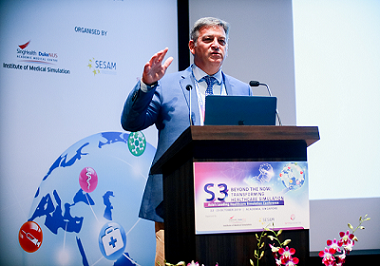Collaborative Crafting of low fidelity simulation by medical undergraduate to Promote Higher-Order Cognitive Skills in Physiology Among Medical Undergraduates: A mixed method study
1) Introduction:
Lectures, a common method of teaching, do not facilitate the acquisition of higher order cognitive skills (HOCS) like application and analysis. Research has demonstrated that students learn better by actively interacting with the material they need to study. This study explored acquisition of HOCS in medical undergraduate students who prepared low fidelity simulation as physiological physical exhibits demonstrating a physiological process and also analyzed their perception regarding the process.
2) Methods and Results:
This mixed method study was conducted in Department of Physiology, AIIMS Rajkot after approval of Institute Ethics Committee. 50 students of MBBS phase 1 volunteered for this project. The students were divided into 4 groups of 12 or 13 and selected a topic on either sensory neurophysiology or renal physiology. After the pretest, students prepared low fidelity simulation in form of physiological physical exhibits. Faculty guided the students for exhibits (simulation model) making during 3 weeks duration. HOCS acquisition was assessed using MCQ posttest. A validated feedback questionnaire collected responses on the process of exhibit making, the teaching process and the evaluation. A focused group discussion was carried out with a group of 10-12 students to assess the perception of students regarding the process.
Students completed Physical Exhibits (simulation working models) of sensory pathway, light reflex & conjunctival reflex, micturition reflex mechanism and automatic bladder. Post test scores show significant improvement compared to pretest scores (17.28 ±2.33 vs 11.43±2.18, p<0.01). Students perceive main enablers being different skills of each team member, teamwork (collaboration), guidance from teacher, online resources and sufficient time, while major hinderance were logistical challenges, acquiring material for structure and electronic circuits. Students enjoyed the process and acquired in-depth knowledge of physiological concepts. Improved communication skills, teamwork and peer learning were important aftereffects. Students expressed willingness to be involved in such activities.
3) Discussion:
Construction of low fidelity simulation like physiological physical exhibits demonstrating physiological process is an effective method for acquiring HOCS of analysis and application in physiology. It is an enjoyable learning experience which also promotes acquisition of soft skills like teamwork, collaboration and effective communication among medical undergraduates. Students found the simulation model building project rewarding despite challenges, and suggest integrating it further into the curriculum
© 2025 SingHealth Group. All Rights Reserved.














